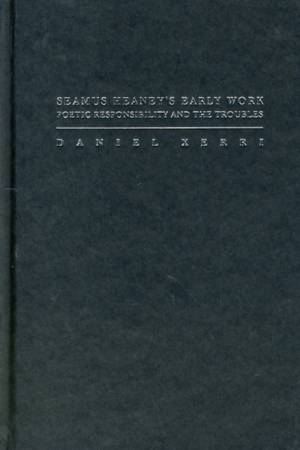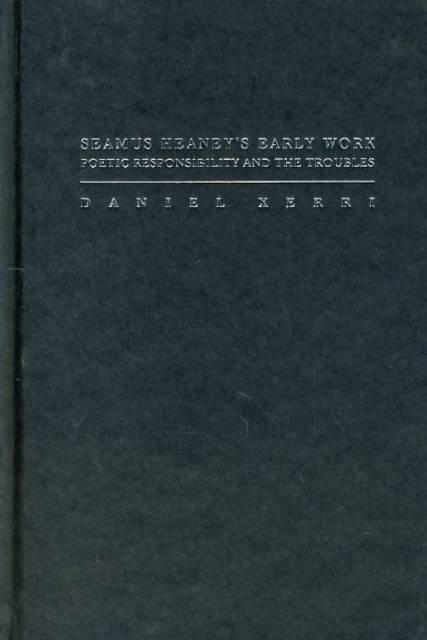
Bedankt voor het vertrouwen het afgelopen jaar! Om jou te bedanken bieden we GRATIS verzending (in België) aan op alles gedurende de hele maand januari.
- Afhalen na 1 uur in een winkel met voorraad
- In januari gratis thuislevering in België
- Ruim aanbod met 7 miljoen producten
Bedankt voor het vertrouwen het afgelopen jaar! Om jou te bedanken bieden we GRATIS verzending (in België) aan op alles gedurende de hele maand januari.
- Afhalen na 1 uur in een winkel met voorraad
- In januari gratis thuislevering in België
- Ruim aanbod met 7 miljoen producten
Zoeken
Omschrijving
This monograph discusses a critical element in the early poetry of Seamus Heaney: the question of poetic duty and responsibility with specific reference to the poetry he published before moving from Ulster to the relative safety of the Irish Republic. The work seeks to demonstrate how the first four poetry collections by Heaney exhibit a progression in how the poet, after coming to grips with his artistic vocation, finally discovers the means by which to address the terrible events that afflicted Northern Ireland at the time. The very first poem in Death of a Naturalist informs us that Heaney is fully committed to the use of the pen to 'dig'(DN1)into all that constitutes his country. Besides other things, this is a declaration by someone willing to do something about the problems of his community. However, the aim of this study is to show how difficult and, at times, burdensome the artistic call has been for Heaney. The first to collections give a picture of a budding poet developing a style of his own, as well as creating in his mind the conception of the poet's figure as some sort of diviner, shaman tapping the unknown and retrieving wisdom for his people. We come to see how the image of darkness is used as a symbol of the Jungian collective unconsciousness to which the poet has special means of access. Death of a Naturalist and Door into the Dark lay the foundations for the poet's engagement with 'external reality'(OG449)in Heaney's future collections. Wintering Out focuses primarily on the question of the Irish Language and investigates the problems elicited by the poet's use of the English language as a poetic medium. In North, Heaney grapples with the dilemma of how best to respond to Northern Ireland's political and religious climate, the dilemma of whether one should use the 'symbolic' or 'explicit' mode of poetry-writing. Xerri does a remarkable job detailing the poems in the first four collections of Heaney as well as considering his critical writing and the relationship between poet and his vocation. Heaney does make the issue of the poet's responsibility an issue in his early w
Specificaties
Betrokkenen
- Auteur(s):
- Uitgeverij:
Inhoud
- Aantal bladzijden:
- 124
- Taal:
- Engels
- Reeks:
Eigenschappen
- Productcode (EAN):
- 9781933146911
- Verschijningsdatum:
- 30/06/2010
- Uitvoering:
- Hardcover
- Formaat:
- Genaaid
- Afmetingen:
- 155 mm x 226 mm
- Gewicht:
- 294 g

Alleen bij Standaard Boekhandel
+ 92 punten op je klantenkaart van Standaard Boekhandel
Beoordelingen
We publiceren alleen reviews die voldoen aan de voorwaarden voor reviews. Bekijk onze voorwaarden voor reviews.









